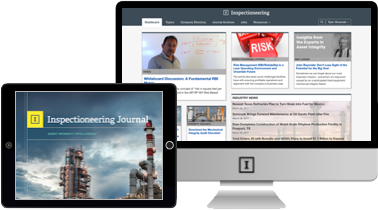Introduction
As a young boy, I remember an admonition from my parents: “Greg, learn from your mistakes so you don’t repeat them. Better yet, learn from the mistakes of others when you can.” In this short article I will share, from personal observations in the field, many factors and elements in establishing and running a successful risk-based inspection (RBI) program that come from experience. I hope to leave you with some food for thought that can help you get additional value from the RBI process and help you avoid costly pitfalls.
How often do we hear of hazardous releases and catastrophes in our industry that indicate we are not learning from the past? I remember a keynote presentation from John Reynolds at a recent API Inspection Summit where he opined that, after almost 50 years of experience and countless MI program gap assessments and audits, many of the incidents we experience in industry are from repetitive mistakes; we often do not learn from the past and make the same mistakes. Unfortunately, it almost seems part of the human condition, doesn’t it?
So, we turn to new work practices, structure, procedures, programs, and technology in attempts to overcome improper, ineffective, bad and/or unprofitable habits, thoughts, and actions. Carolyn Merritt, a past chairperson of the United States Chemical Safety Board, shared a phrase from a Booz, Allen Hamilton report on a couple of industry incidents related to observations about a corporate attitude, behavior, or tendency: "a normalization of deviance where risk levels gradually crept up due to evolving operating conditions."
In this same report, attitudes and motivation played a large role in these failures. Just because it is a false alarm today doesn’t mean it won’t be a real alarm tomorrow. This is one of the reasons that, when I am teaching my API RP 581 training course, I often caution students not to make decisions they are not qualified to make and not to place false trust in automated systems. Don’t put off important things thinking someone else will fix them later. If it isn’t working correctly, fix it! Don’t ignore it! The next person won’t be able to discern false alarms from real alarms.
What follows are a couple of examples I will offer RBI practitioners that will hopefully spur you on toward excellence in RBI modeling. Remember that motive and attitude are huge in anything in life. Are you doing it for the right reasons? Or are you taking shortcuts that could lead to an unwanted outcome?

















Comments and Discussion
Add a Comment
Please log in or register to participate in comments and discussions.